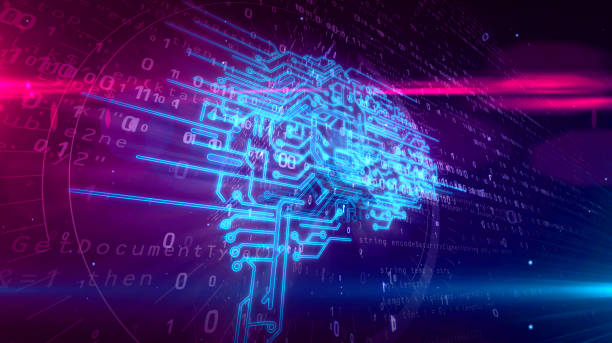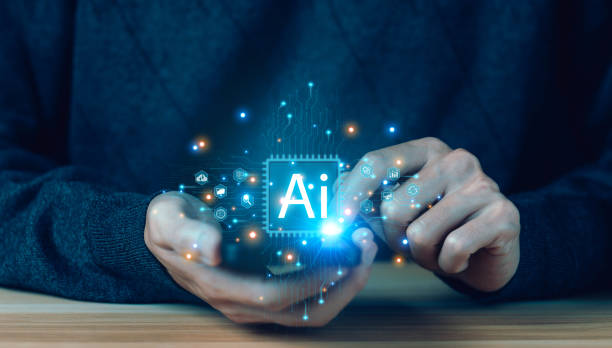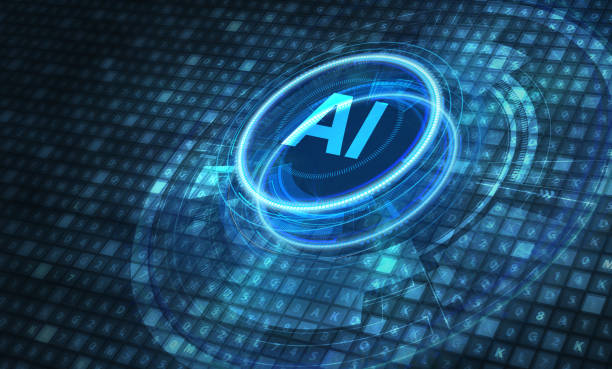What is Artificial Intelligence? Basic Definitions and Concepts
Artificial intelligence (AI) is a branch of computer science that deals with building machines and systems capable of performing tasks that typically require human intelligence.
These tasks include learning, reasoning, problem-solving, perception (such as face and voice recognition), and natural language processing.
The main goal of #ArtificialIntelligence is to create systems that can think and decide independently, without the need for direct human intervention.
These systems analyze data through complex algorithms and mathematical models, extracting patterns that allow them to make predictions and make smart decisions.
There are various definitions of artificial intelligence, but a comprehensive definition is that artificial intelligence is an effort to build systems that can exhibit intelligent behavior.
This intelligent behavior can include the ability to learn from experience, adapt to new conditions, understand and infer complex concepts, and solve complex problems.
Read more about artificial intelligence here.
Basic concepts in artificial intelligence include Machine Learning algorithms, Neural Networks, Natural Language Processing (NLP), and Expert Systems.
Each of these concepts plays an important role in the development and application of artificial intelligence.
Does your company’s website perform as it should for your brand? In today’s competitive world, your website is your most important online tool. Rasaweb, a specialist in designing professional corporate websites, helps you to:
✅ Gain credibility and customer trust
✅ Convert website visitors into customers
⚡ Get free consultation!
Types of Artificial Intelligence in terms of Ability and Application
Artificial intelligence can be categorized in various ways.
One of the most common classifications is based on the capabilities of artificial intelligence.
In this classification, artificial intelligence is divided into three main types:
- Narrow AI or Weak AI This type of artificial intelligence is designed to perform a specific task and performs very well in that task.
Most of today’s artificial intelligence systems are of this type.
For example, a facial recognition system or a product suggestion system in an online store. - General AI or Strong AI This type of artificial intelligence has the ability to perform any task that a human is capable of.
No general artificial intelligence system yet exists, but this is the long-term goal of many researchers. - Super AI This type of artificial intelligence surpasses human intelligence and can perform better than humans in all fields.
The existence of such intelligence is still hypothetical.
Click here to preview your posts with PRO themes ››
In addition to the classification based on ability, artificial intelligence can also be classified based on its applications.
For example, artificial intelligence in medicine, artificial intelligence in education, artificial intelligence in finance, and so on.
Each of these areas uses artificial intelligence algorithms and techniques to solve its specific problems.
Machine Learning, the Beating Heart of Artificial Intelligence
Machine Learning is a subset of #ArtificialIntelligence that allows systems to learn from data without explicit programming.
In other words, systems can identify patterns and relationships by analyzing data and use these patterns to make predictions or decisions.
Machine learning algorithms allow systems to improve their performance over time as they receive more data.
There are different types of machine learning algorithms, including Supervised Learning, Unsupervised Learning, and Reinforcement Learning.
In supervised learning, the system is trained using labeled data.
In unsupervised learning, the system must extract patterns from unlabeled data.
In reinforcement learning, the system learns how to behave by interacting with the environment and receiving rewards or penalties.
Machine learning plays a very important role in the development and application of artificial intelligence.
Many of today’s artificial intelligence systems use machine learning algorithms to perform various tasks, including face recognition, voice recognition, product recommendation, and stock market prediction.
| Algorithm | Learning Type | Application |
|---|---|---|
| Linear Regression | Supervised | Price prediction, trend analysis |
| Decision Tree | Supervised | Disease diagnosis, customer classification |
| K-Means Clustering | Unsupervised | Market segmentation, anomaly detection |
| Neural Networks | Supervised/Unsupervised | Image recognition, language processing |
Applications of Artificial Intelligence in Today’s World
Artificial intelligence is currently used in many industries and fields and plays an important role in improving efficiency and increasing productivity.
Some of the most important applications of #ArtificialIntelligence include:
- Medicine Disease diagnosis, drug development, provision of personalized treatments
- Finance Stock market prediction, fraud detection, financial advice
- Transportation Self-driving cars, route optimization, traffic management
- Education Providing personalized training, assessing students, providing automated feedback
- Manufacturing Optimizing production processes, quality control, predicting machine failures
- Customer Service Automatically answering customer questions, providing technical support, providing personalized suggestions
These are just a few examples of the applications of artificial intelligence in today’s world.
With the advancement of technology, it is expected that the applications of artificial intelligence will become more widespread and play a more important role in our lives.
See more examples of artificial intelligence applications here.
Did you know that your company’s website is the first point of contact for 75% of potential customers?
Your website is the face of your brand. With Rasaweb’s corporate website design services, build an online presence that earns customer trust.
✅ Create a professional and lasting image of your brand
✅ Attract target customers and increase online credibility
⚡ Get free consultation from Rasaweb experts!
Challenges Facing the Development of Artificial Intelligence
Despite its many advantages, the development and application of artificial intelligence also comes with challenges.
Some of the most important of these challenges include:
- Data Training artificial intelligence systems requires a large amount of high-quality data.
Collecting and processing this data can be very costly and time-consuming. - Privacy Using personal data to train artificial intelligence systems can raise privacy concerns.
- Ethics The decisions made by artificial intelligence systems must be ethical and fair.
Ensuring this can be very difficult. - Employment Automating processes using artificial intelligence can lead to job losses in some industries.
- Security Artificial intelligence systems can be vulnerable to cyber attacks.
To address these challenges, it is necessary for governments, companies, and researchers to work together to develop solutions that help to use #ArtificialIntelligence responsibly and ethically.
The Impact of Artificial Intelligence on the Future of Jobs
Artificial intelligence will have a profound impact on the future of jobs.
Process automation and increased productivity can lead to changes in the nature of jobs and the creation of new jobs.
Some jobs may disappear completely, while others will require new skills.
It is important that individuals and organizations prepare for these changes and acquire the necessary skills.
Some of the skills that will be more important in the future include: problem-solving skills, critical thinking skills, creativity skills, communication skills, and teamwork skills.
In addition, knowledge and skills in the field of artificial intelligence and machine learning will also be very valuable.
Read more predictions about the future of jobs here.
Governments and organizations should develop training and retraining programs to help individuals acquire the skills they need to succeed in the future labor market.
Artificial Intelligence and its role in industry
Artificial intelligence (AI) has emerged as a transformative force across various industries.
From manufacturing and healthcare to finance and transportation, AI is changing the way companies operate and compete.
With the ability to analyze vast amounts of data, automate tasks and make intelligent decisions, AI empowers businesses to enhance efficiency, productivity and innovation.
This chapter delves into the multifaceted role of AI in industry, highlighting its benefits, applications and challenges.
Additionally, it explores the impact of AI on the job landscape and the need for reskilling and upskilling of the workforce.
| Industry | Application | Benefits |
|---|---|---|
| Manufacturing | Predicting machine failure | Reduced downtime |
| Healthcare | Medical image diagnosis | Faster disease detection |
| Finance | Fraud detection | Reduced financial losses |
| Transportation | Self-driving cars | Reduced accidents |
Artificial Intelligence and Cyber Security
Artificial intelligence (AI) is a double-edged tool in the realm of cybersecurity.
On one hand, AI enables cyber defenders to detect and respond to threats faster and more accurately, automate their security systems, and create stronger defenses against cyberattacks.
AI algorithms can analyze vast amounts of data to identify patterns and anomalies that may indicate malicious activity.
On the other hand, cybercriminals can also use AI to improve their attacks, create more deceptive and advanced malware, and bypass traditional security measures.
This chapter explores the dual aspects of AI in cybersecurity, examining how organizations can use AI capabilities to enhance their cyber defenses while mitigating the risks associated with AI-based attacks.
This chapter also addresses the ethical considerations and the need to develop AI responsibly in cybersecurity.
Does your company’s website make a professional and lasting first impression on potential customers? Rasaweb, with professional corporate website design, not only represents the credibility of your brand, but also opens a path for your business to grow.
✅ Create a powerful and reliable brand image
✅ Attract target customers and increase sales
⚡ Get free consultation
Artificial Intelligence and Digital Transformation
Artificial intelligence (AI) has emerged as a critical factor in the digital transformation across various industries.
Companies are using AI to automate processes, improve customer experience, and gain deeper insights from data.
From chatbots that provide customer service to AI algorithms that optimize the supply chain, AI enables companies to increase their efficiency, innovation and competitiveness.
This chapter explores the role of AI in digital transformation, examining how organizations can use AI technologies to drive digital transformation, unlock new opportunities and remain competitive in the evolving digital landscape.
This chapter also explores the challenges and best practices associated with implementing AI in digital transformation initiatives.
The Future of Artificial Intelligence and the Prospects Ahead
The future of artificial intelligence (AI) holds unlimited promise and offers exciting prospects in various fields.
As AI technologies continue to advance, we can expect AI to become even more integrated into our daily lives, shaping industries, communities and the entire world.
From self-driving cars and personalized virtual assistants to advanced drug discovery and sustainability solutions, AI has the potential to address some of the most important challenges facing humanity.
This chapter explores the future of AI and examines emerging trends, potential advances, and predictions for how AI will evolve in the years to come.
This chapter also addresses the ethical and social considerations associated with AI development and the need for responsible and human-centered AI.
Ultimately, the development of #ArtificialIntelligence requires attention to its ethical and social dimensions.
It must be ensured that this technology is developed and used for the benefit of all members of society and that inequalities and discrimination are prevented.
With cooperation and collective effort, we can create a future in which artificial intelligence is used as a tool to improve life and promote human well-being.
FAQ
| Question | Answer |
|---|---|
| What is the definition of artificial intelligence (AI)? | It is a field in computer science that aims to create intelligent machines that can think, learn, solve problems, and make decisions like humans. |
| Mention some common AI applications. | Includes self-driving cars, voice assistants (such as Siri and Alexa), recommendation systems (such as Netflix and Amazon), face recognition, and medical diagnostics. |
| What is the difference between Narrow AI (ANI) and General AI (AGI)? | Narrow AI is specialized in one specific task, while General AI possesses a human intellectual ability to perform any cognitive task. |
| What is Machine Learning and its relationship to Artificial Intelligence? | Machine learning is a branch of artificial intelligence that focuses on developing algorithms that allow systems to learn from data without explicit programming. |
| What are Artificial Neural Networks? | They are computational models inspired by the structure and function of the human brain, and are used in deep learning to process data and discover complex patterns. |
| Mention some ethical challenges related to artificial intelligence. | Includes privacy issues, bias in data and algorithms, job loss, and accountability in the event of errors or unfair decisions. |
| What is Natural Language Processing (NLP)? | It is a branch of artificial intelligence that focuses on enabling computers to understand, interpret, and generate human language in a useful and interactive way. |
| How can artificial intelligence affect the labor market? | It can lead to the automation of certain routine tasks, requiring the retraining of workers and creating new jobs in the fields of design, development, and maintenance of artificial intelligence systems. |
| What is Computer Vision? | It is a field in artificial intelligence that enables computers to “see,” understand, and interpret images and videos in the same way that humans do, allowing them to recognize objects and faces. |
| What is the importance of data in developing artificial intelligence systems? | Data is the fuel that powers artificial intelligence systems, especially in machine learning. The quality and quantity of data significantly affect the accuracy and performance of models and their ability to learn and make correct decisions. |
And other services of Rasa Web Advertising Agency in the field of advertising
Smart custom software: A combination of creativity and technology to analyze customer behavior by optimizing key pages.
Smart advertising campaign: Designed for businesses looking to manage campaigns through attractive user interface design.
Smart conversion rate optimization: Designed for businesses looking to increase sales through intelligent data analysis.
Smart Marketplace: An exclusive service for online growth based on a SEO-oriented content strategy.
Smart website development: A professional solution for attracting customers with a focus on using real data.
And over a hundred other services in the field of internet advertising, advertising consulting and organizational solutions
Internet advertising | Advertising strategy | Advertorial
Sources
Artificial intelligence and ethical transformations in organizations
,The impact of artificial intelligence on the Iranian economy
,Artificial intelligence is not a chain for humans
,Artificial intelligence in the future of countries
? Are you ready to grow your business in the digital world? Rasaweb Afarin Digital Marketing Agency paves your way to success by providing comprehensive and innovative solutions, including modern user interface website design and targeted marketing strategies.
📍 Tehran, Mirdamad Street, next to the Central Bank, South Kazerun Alley, Ramin Alley No. 6
“`












